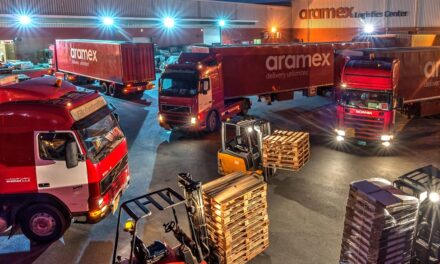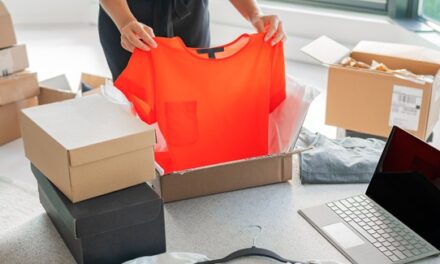
Middle Eastern promise
Chris Dolan interviews Aramex founder and CEO Fadi Ghandour, as Post&Parcel’s sister publication, Mail & Express Review, looks at a Middle Eastern success story. Some people might regard Aramex as a well kept secret given its size! Can you give our readers some idea of the scale and nature of your business?
Aramex has been around for the past 28 years. If we are a secret it is because the people who think so are simply not paying attention. We have been around from the very early days of this industry and we have a unique model that has allowed us to thrive all those years in extremely turbulent times.
Our secret, if you want to call it that, is that we are not an asset based company in an industry that is dominated by integrators and giants which own all sorts of assets all over the world.
We were told early on that we could not survive, let alone thrive, if we did not own our global network, if we do not own our planes, and that we should not sell express and freight at the same time, you had to be either. Well, from the late 1980s we had done all that and here we are with 8,000 people, in 300 locations, in over 45 countries; with a strategic alliance network serving every single city in the world; generating over US$500m in revenues; and consistently profitable for the past 15 years.
You founded Aramex in 1982. How has the Arab business world changed during that time?
Arab business has changed tremendously since the early 1980s. We are much more integrated into the rest of the world, a new generation of entrepreneurs is popping up everywhere, private equity is here, public markets are deeper and bigger, governments are looking to reform continuously and to allow foreign investment. We are where the Asian tigers were when they first realised they were tigers. We have a long way to go but I think the infrastructure (soft and hard) is being built seriously and this region will be one of the next growth regions in knowledge economies and global trade.
You have long been an advocate of developing more intra Arab trade. How is this going?
Intra Arab trade is not where it should be. We should have opened our borders to each other long before Europe did because we have been talking about an Arab common market much longer than the Europeans. The Gulf Co-Operation Council (GCC) is doing more now to integrate: harmonising of tariffs is here and customs union is being more seriously implemented.
But we still need better intra country roads, customs procedures are still very cumbersome, a rail system is being talked about but needs to move faster and moves to a common currency in GCC are hesitant. We have all the ingredients but we are still a long way away.
What is the current ownership profile of the business? Given that you were the first company from the Arab world to go public on NASDAQ why did you subsequently decide to delist? Why then go public again in Dubai?
We did a leveraged buyout and delisted the company from NASDAQ because we did not think that was the right place for us to be listed. We were a micro cap in a region that US investors did not understand. Now we are on DFM in Dubai we have an extremely powerful brand and an investor base that understands our value.
How has the recession impacted the various parts of the Aramex business?
Recession is the ultimate test of any business and our business model has been tested and verified. Being a non asset based company means we have a very flexible cost base and having little debt makes us much more agile. In a recession that is where you would want your company to be, flexible and able to continue serving clients without any major disruptions or distractions related to restructuring, etc. We have lost some revenue, as everyone has, but we have improved our profitability tremendously because of our flexible cost base. And we have done that without any layoffs.
Has the economic downturn altered your long term aspirations?
Not at all, we are moving more aggressively towards our long term goals. Some acquisitions and joint ventures are coming up. We have a contrarian view of the situation: we think the best time to invest is in time of crisis or recession. Aramex’s story is one born in recession and crisis in the core markets in which we operate.
Given the current economic situation are customers opting for less movements or reduced cost deferred services rather than more expensive next day express delivery?
We are a low cost operator; we are in a market that has always cared about cost, so we are always able to offer great cost benefit combinations to clients. We continue to do so in these difficult times. We have recently concluded a deal with Air Arabia, a regional low cost carrier in the Middle East, to sell a low cost heavy weight express product. We have also moved a lot of freight on the ground across the GCC instead of flying it, giving our clients a much lower cost base. Express continues to fly on our regular schedules but airlines are giving much better rates nowadays because of over supply in the market.
How important is the growth in e-commerce to Aramex?
E-commerce is of strategic importance for Aramex. It is the only product that has had double digit growth for us in this financial crisis. You will hear much more about various e-commerce services and initiatives that we are going to introduce to the market within the next 12 months.
Your Global Distribution Alliance shows that you believe partnerships are key to the future of Aramex. What are your future plans and how do you see this developing?
We are an alliance based company, it is how we are built and it is how we have reached where we are today. We started this process with Airborne back in the late 1980s and we continue to have that philosophy.
Our future is in the developing world, we understand it, we know how to operate in it and we will continue to invest in it. Africa, Central Asia, China, South East Asia are all very interesting markets: we have presence in some and we are planning to have presence in most, either through acquisition, joint ventures or franchising.
How does Aramex compete with more globally established companies like FedEx and DHL outside of the Middle East, particularly in Asia?
Where ever we operate the global players are there. We have a piece of the market and we will continue to invest in client acquisition to develop our products in those markets: India, Sri Lanka and Bangladesh are cases in point and we do very well in all of them.
China and India are the future and we are going to continue to focus on these two countries as we go forward. In India we already have a good presence with 28 offices and a very large franchise network covering the whole country. We deliver hundreds of thousands of packages a month domestically in India. And China is just starting for us: we expect a lot of good things to happen for us there.
What type of relationships do you have with national posts? Is there a level playing field?
We have long given up on the concept of a level playing field. We play in any field and rely on our innovation and people to be our strategic advantage. National posts need to think competitively like private companies do and stop thinking they can compete by putting restrictions or charging levies and taxes! That is how the world is moving and they should adapt to it fast. Some are and others are far from it.
This article is featured in Mail & Express Review’s November 2009 issue. To subscribe to the industry’s leading publication, click here.











